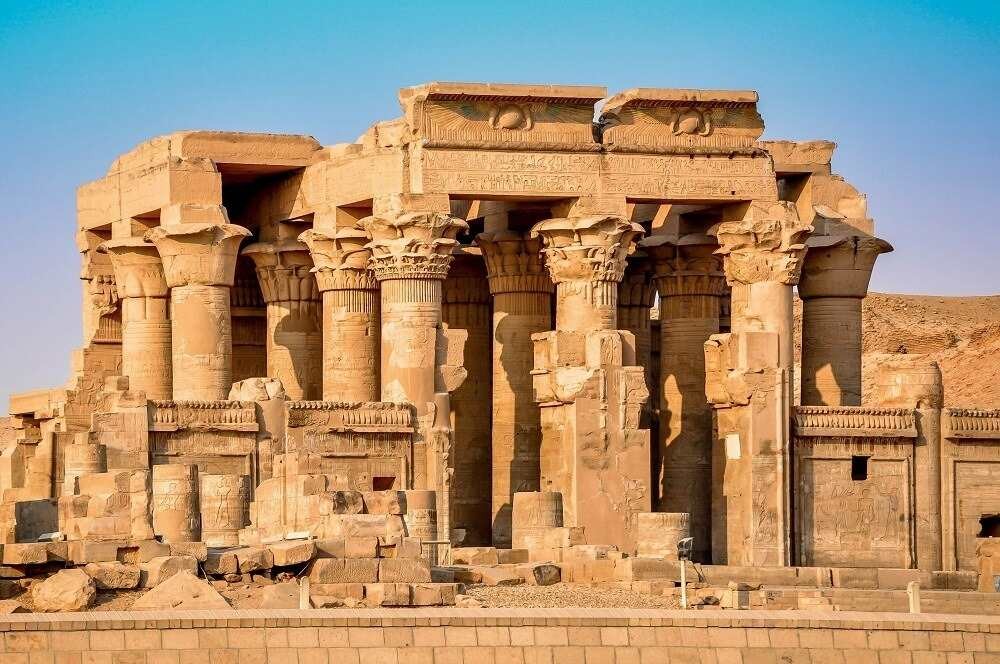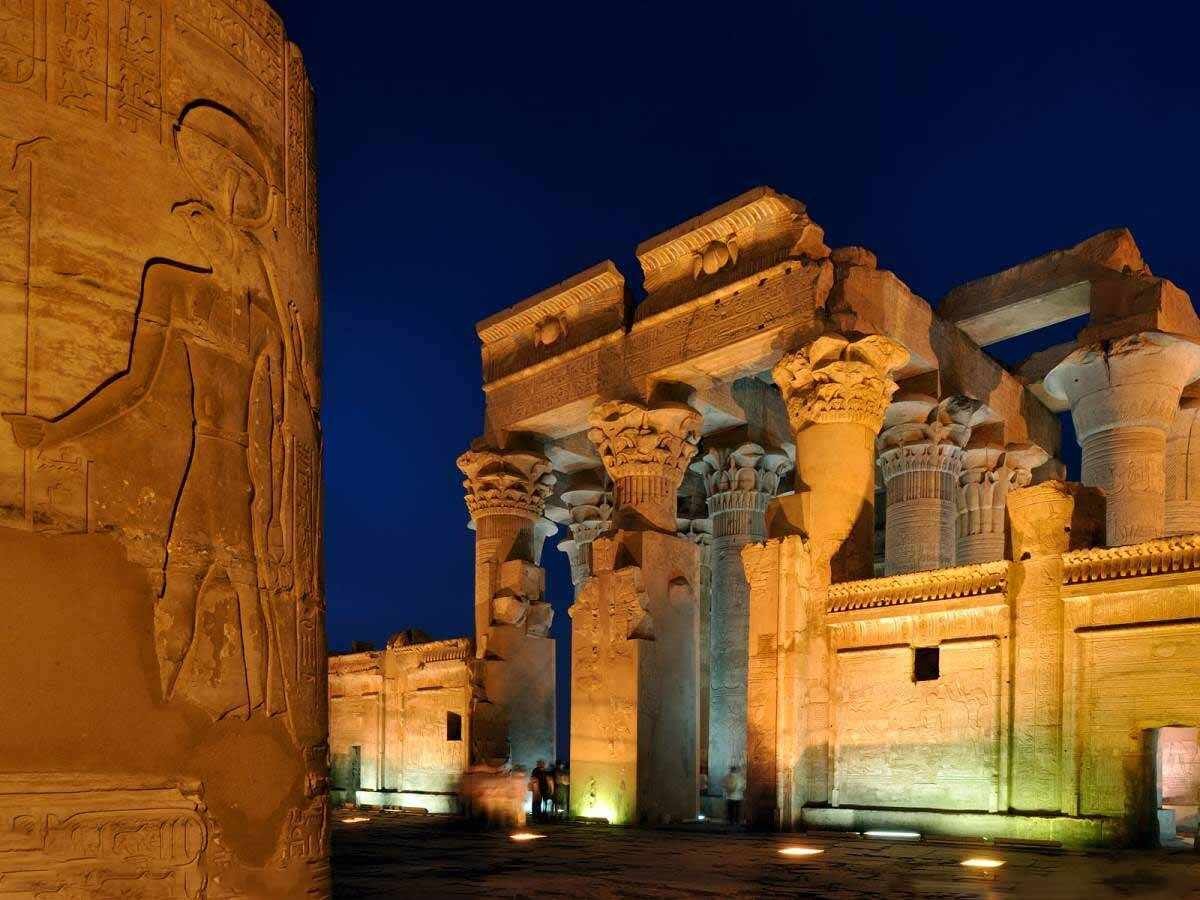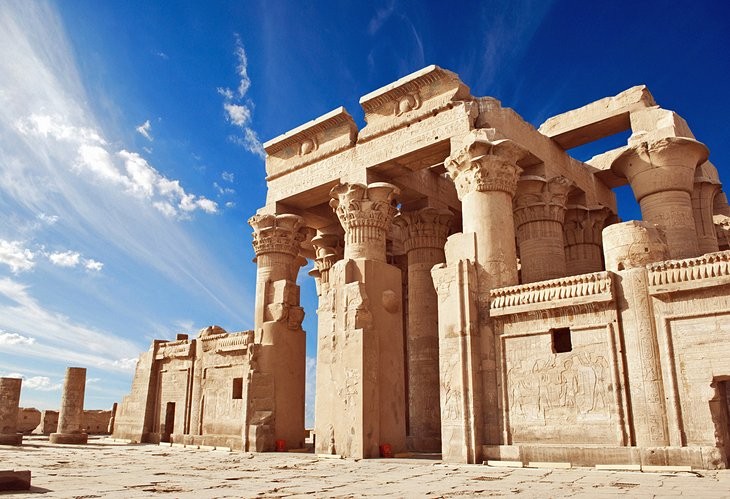The double temple of Kom Ombo is located on the eastern bank of the Nile in Upper Egypt. This ancient Egyptian temple complex is located about 3.5 km southwest of the center of Kom Ombo.
The parts of this imposing building still visible today date from the Ptolemaic and Roman times, from which you can look directly over the Nile! The temple has already been badly affected by forces of nature such as floods and erosion of the masonry. This religious building is called a double temple because the two gods Sobek and Haroeris were worshiped there.
Sobek, also called Sbjk or Sebak, was the crocodile god of Egyptian mythology in ancient Egypt. He was the ruler of the water but was also a fertility god at the same time. His nickname was Djedi, the permanent one. Haroeris was also called Haroëris, Haruaris, Hor-wer, Herwer, or Harwer. Since the Middle Kingdom of Haroeris, the name for a manifestation of the god Horus, who was the main god in the mythology of ancient Egypt. As a local deity in Kom Ombo, Haroeris formed a triad of gods with the gods Ta-sene-no fret and Pa-neb-taut. But in the 18th dynasty, he gained a special meaning as "father of the gods''.

The double temple was built at the time when Omboi (also called Ombos) was next to Elephantine and the administrative center of Ta-Seti, a district in Upper Egypt. More precisely, it originated in the Ptolemaic epoch, which ran from 304 to 31 BC. Lasted. The crocodile god Sobek and the falcon-headed god Haroeris were worshiped in this temple.
Like many other monumental structures in Egypt, large parts of the double temple of Kom Ombo were buried by the sand for a long time. Jacques de Morgan finally uncovered them in 1893 and restored everything. Until the 19th century. Right in front of the temple was the great birth house, also called Mammisi, of Ptolemy VIII Euergetes II. However, it was torn down during a flood of the Nile, and the western parts of the surrounding wall also came loose. However, given that the temple is 20 meters above the level of the Nile, it is difficult to imagine the extent of this catastrophe.
Especially in the recent history of Egypt, Kom Ombo has become more and more a tourist magnet, as visiting the double temple is a fixed program on many Nile cruises. There is 150 km between Luxor and Kom Ombo in the north and Aswan is 40 km south. Especially handy when it comes to Nile cruises is the fact that the ship dock is just 70 meters from the temple. Kom Ombo is part of the Aswan Governorate. Kom Ombo is also connected to Aswan and Luxor by a railway line that runs along the Nile. Aswan is the closest international airport, to Aswan International, although the main artery is the Nile.

In contrast to many other temples in Egypt, the temple of Kom Ombo is dedicated to two deities and thus represents a special feature. The deities are worshiped separately from one another, which means that on the right, southeastern side facing away from the Nile is the crocodile-headed god Sobek, which was consecrated to the god for water and fertility, later to the creator god. On the left, north-western side of the temple, homage was paid to the falcon-headed god Haroeris, the god of light, heaven, and war. Thus the temple was called "House of the Crocodile", but also "Falcon Castle".
Haroeris, who is a manifestation of the god Horus, corresponding to "Horus the Great", formed a triad of gods with Ta-senet-no fret and Pa-neb-tour in Kom Ombo. But Sobek also formed a triad with Hathor and Chons.
Archaeologists and Egyptologists believe that the part of the temple that is still visible today was built on previous buildings from the Middle Kingdom and the New Kingdom. The temple was 51 m wide and 96 m long and was surrounded by an enclosure wall. The decoration of the temple was until the 3rd century. worked after Chr., but it was never completed. Thus, in the rear section of the temple, where the chapel is located, only prepared reliefs can be seen. Other parts of the temple, such as the western section of the access pylon with the adjoining wall and the Mammisi attached to it, fell victim to the Nile floods.
The southeast section of the temple, where the tower of the great pylon representing the Roman Emperor Domitian is located, is a 52-line hieroglyphic script that pays homage to Sobek, Hathor, and Chons. Behind the two central entrances in the surrounding wall of the temple, there was once a courtyard with 16 columns on both sides. Today only the lower column sections can be seen, also called the base. They are also richly decorated with hieroglyphics and reliefs. On the pillars, one can see depictions of Tiberius offering gifts to the gods. In the middle of the courtyard are the remains of an altar. This is where the holy barge was placed during the processions.
In the interior of the second columned hall, there is the “room of the offerings”. Here you can see the representations of Pharaoh Ptolemaios VIII. Euergetes II. And his wife Cleopatra III. and Pharaoh Ptolemy XI. See News Dionysus. This room is followed by 3 transversely arranged front rooms, which were designed by Pharaoh Ptolemy VI. Philomentor and which can also be seen in the reliefs. Behind it, there are 2 sanctuaries, which were dedicated to the two gods. However, only a fragment of decoration and a dedication inscription remains in the sanctuaries.
The interior of the temple was surrounded by 2 corridors, one of which led into the courtyard with the 16 columns. The second led directly to the center of the temple. The rooms in the center show depictions of gods and pharaohs, some of which, however, remained unfinished. In the inner corridor, you can see a relief that shows surgical instruments and is called a special feature. The reliefs in Kom Ombo are among the most important of Ptolemaic architecture.
Outbuildings and ancillary facilities
Like the temple complexes of Luxor or Karnak, there are also some outbuildings in Kom Ombo.
The Mammisi - a birthplace
West of the forecourt was until the 19th century. the Mammisi, a birth house, has the shape of a small temple and is always at a right angle to the main temple. The Mammisi can be found in many temples, such as that of Luxor. In Kom Ombo, the Mammisi was destroyed by a flood of the Nile. It was built by Pharaoh Ptolemy VIII Euergetes II. In Kom Ombo, a relief of the Pharaoh and two gods has been preserved.
The Hathor Chapel
A small chapel is to the right in the southern corner of the courtyard. The chapel was once built by Emperor Domitian in honor of the goddess Hathor but unfortunately remained unfinished. In Greek mythology of the eastern Mediterranean, Hathor was equated with the goddess Aphrodite, who was also the goddess of fertility. The crocodile mummies and sarcophagi were kept in this small chapel and can now be admired in a small museum that was set up in this chapel. The mummies are evidence of the former cult around the crocodile-headed god Sobek.
The Nilometer
The nilometer is a water level meter located in the northwest part of the temple complex. Other miles were in Elephantine, Memphis, or Edfu. The Nilometer in Kom Ombo was built in the form of a round well shaft that you can walk through. In it, one could read the level of the Nile from the markings. These results were of great importance to ancient Egypt as they set the level of taxes for citizens. It was primarily about agriculture's need for water to irrigate the soil. The more water was available, the better the harvest and the higher the taxes that the citizens of Kom Ombo, Edfu, etc. could pay.
On a hill above the Nile lies the Greek-style double temple, which is dedicated to the gods Sobek and Haroeris (Horus the Old). It consists of two interconnected system parts that share the first pylon, the courtyard, and the portico. Only from the columned hall does the expression of two symmetrical halves start to form up to the sanctuary. The complex was built under the rule of the Ptolemies in the 2nd century BC. Chr.
Particularly worth seeing: In the Hathor Chapel, embalmed 2,000-year-old, sacred crocodiles are on display. So if you get in the mood for a change on your Egypt vacation, then you know where to find it!
On Nile cruises, you have the opportunity to go ashore in Edfu and visit Kom Ombo. Since the pier in Edfu is only 70 m away from the temple, this fascinating journey into the past of Egypt is worthwhile! Kom Ombo is a historic and exciting place.
To find out more about the Nile cruise or the process, follow the link here!
Have fun in Kom Ombo!
Enjoy your Egypt tours with us, Your tour with us will be memorable.
Find out our latest news, promotions, and professional tips. Know before you book your next Egypt tours
Egypt has many historical sites that you can visit and enjoy. Each tour is different and unique. If you go on a Nile cruise, you can visit Abu Simbel, Aswan, and Luxor in the South and enjoy the temples, tombs, and the treasures of the Nile. In the North, enjoy the Pyramids of Giza, The Egyptian Museum, Sakkara. Mosques, churches in Cairo, and many landmarks located in the city of Alexandria. On the East, Enjoy a beach tour for diving, snorkeling, and swimming in the Red sea. Every city has its charm, history, and flavor where you can do many tours and activities.
Your Egypt Tours is one of Egypt’s leading and most trusted travel agencies, known for its personalized service and expert care. As a top-rated company for Egypt tour packages, we ensure every Egypt trip is safe, seamless, and unforgettable, offering competitive prices, excellent customer service, and the highest standards of quality. With us, you’re always in good hands.
The average cost of a one-week trip in Egypt is around 1600 USD, including visits to tombs, temples, and a Nile cruise. Prices vary depending on the Egypt tours and the level of luxury you choose.
It’s not recommended to drink tap water in Egypt, as it’s highly chlorinated and may cause stomach issues for travelers. During your Egypt tours, it’s best to drink bottled water and use tap water only for washing or brushing your teeth.
The best time to enjoy Egypt tours is from September to March, when the weather is mild and pleasant. During these months, temperatures are ideal for sightseeing and Nile cruises. Summer (May to September) can be very hot, but it’s also a good time for budget travelers.
Egypt is generally hot and sunny most of the year, with winter falling between November and January, and summer peaking from June to August. Winters are mild, while summers can get very hot, especially in Luxor and Aswan. The pleasant weather from September to March makes it the best time to enjoy Egypt tours and explore the country's top attractions comfortably.
Yes, Egypt is a very safe country to visit, with a low crime rate and strong security measures in all tourist areas. The government ensures that accommodations and attractions remain clean and well-monitored for travelers’ comfort. When you book Egypt tours, you’ll find professional guides and organized arrangements that make your trip worry-free and enjoyable.
Egypt offers adventures for every traveler. Explore the majestic Pyramids of Giza, sail along the Nile on a Luxury cruise between Luxor and Aswan, and discover ancient temples and tombs that tell the story of the Pharaohs. Dive or snorkel in the Red Sea at Hurghada and Sharm El Sheikh, or enjoy a relaxing beach escape. Book one of our Egypt tours to experience the perfect mix of history, culture in one unforgettable journey.
Yes, you can, summer is still a great time to explore Egypt! While temperatures can rise to around 45°C, seaside resorts like Hurghada, Sharm El Sheikh, and Marsa Alam offer refreshing escapes with diving and snorkeling opportunities. Sightseeing in the early morning or evening helps you avoid the midday heat. Summer also brings great deals on hotels and services, making it ideal for travelers on a budget. Whether you’re seeking relaxation or adventure, Egypt tours during summer can still be an enjoyable and memorable experience.
Egypt has a modest dress code, especially for women, since it’s a Muslim country. Light, comfortable clothing is fine, but avoid short shorts or skirts. When visiting religious sites, cover your shoulders and knees. During Egypt tours, you can dress casually and comfortably; formal wear is optional unless you want to make your Nile cruise dinner extra special.
You can easily obtain a visa upon arrival at Cairo Airport, the process is simple for USA, UK, Canadian, Australian, and European citizens. The visa costs $25 USD and can be purchased at the visa office before immigration. You can also apply for an E-Visa through the official portal: www.visa2egypt.gov.eg. During your Egypt tours, our team can assist you with all visa-related inquiries to make your arrival smooth and stress-free.
Your Egypt Tours travel agency recommends two weeks so that you can enjoy the temples and tombs of Luxor and Aswan, explore the sights of Cairo, and relax in the Red Sea islands and nature reserves.
The best Egypt Nile River cruise depends on your preferences, budget, and how many nights you wish to spend on board. For a truly unforgettable experience, we recommend a 5-star luxury Nile cruise that offers exceptional comfort and service. If you prefer a more private and intimate journey, choose a Dahabiya Nile cruise, ideal for small groups of around 15 people. For adventurous travelers, the traditional Felucca boats provide a simple and authentic way to sail the Nile during your Egypt tours, though they offer fewer amenities.
The best time to visit Egypt is generally from October to April where it is suitable for outdoor activities and sightseeing.
Egypt travel usually have guided tours to archaeological sites, museums, and historical landmarks. Also have optional activities may include hot air balloon rides over Luxor, snorkeling in the Red Sea, or desert safaris.
